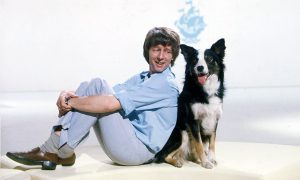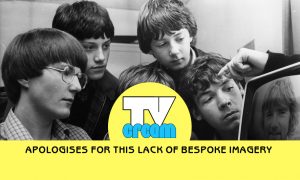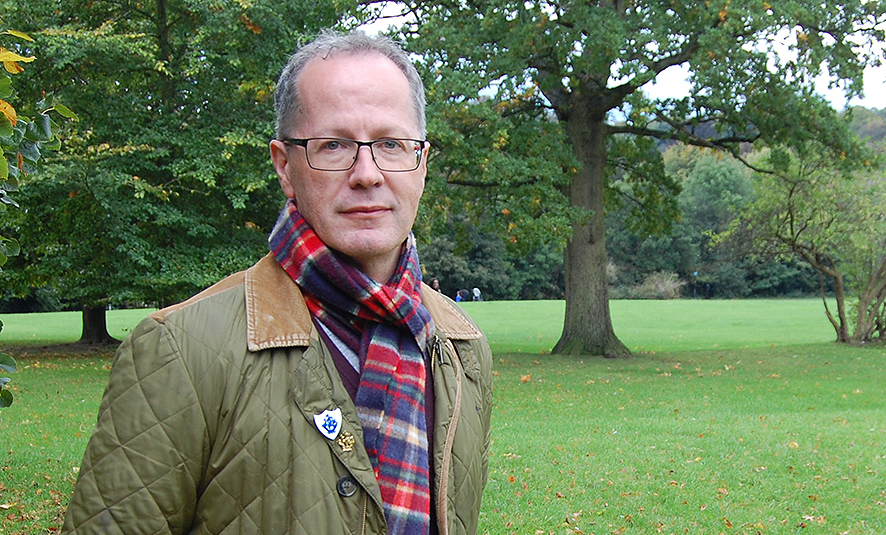
Richard Marson, October 2017
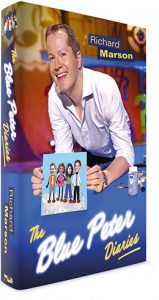 Hello!
Hello!
From ‘doable barkers’ to Liz Barker! Richard Marson – he of the ‘Totally Tasteless’ John Nathan-Turner biography – has a new book out. The Blue Peter Diaries is published by Miwk and is a candid, completely gripping and gossipy (what else?) memoir of his stint as editor on the flagship children’s show, based on his diaries of the time. A time when the venerable vessel was crewed by one of the all-time classic line-ups (Konnie, Matt, Simon and Liz) but eventually ended up in stormy waters.
It’s all in there, from Stuart Miles’ secret love for Richard Bacon, to Liz being kitted out in sex shop gear for a BP panto, to Valerie Singleton stealing Peter Purves’ anecdotes when meeting royalty, to Richard’s own enforced departure from the show – and then the BBC – following the ‘Whose Shoes’ phone-in cock-up and the ‘name the Blue Peter cat’ debacle.
In October, TV Cream spent an afternoon with Richard in his home city of St Albans. And here’s what he had to say…
![]()
Presumably the idea for this book has been knocking around for a while.
No, I’ll tell you what happened. It was really Biddy [Baxter] who was responsible. Next year is Blue Peter’s 60th anniversary, and she said to me, ‘Darling, have you thought about doing a book?’ I said, ‘Well I kind of did the book, didn’t I [for the 50th]? And I don’t really think there’s a huge amount to celebrate in the last 10 years of Blue Peter’s history.’ But then I was talking to my wife about it, and she said, ‘If you’re going to do something, you should do something about your time on it – you were there for 10 years, or the best part of’. I thought, ‘Well, I don’t know that I want to revisit it with hindsight very much’. But I had contributed an extract from one of my diaries to a charity thing, and they’d liked that. I thought, ‘Well, maybe’. It’s a bit squirmy, because I love diaries myself and I love reading diaries, but the best diary writers are people who don’t really spare themselves. So part of this process has been incredibly painful.
Those 10 years on the show are probably your best and your worst.
I think it’s a delicate thing to get right, but I felt it’s 10 years since I had anything to do with Blue Peter and that feels like a significant amount of time. When I was on the show, I seemed like this was it forever. But life does inexorably roll on. And I was thinking, some things as grim as it can get happened, and some things were wonderful and joyous and fresh and different – so I felt like you had to have some distance. I had been considering destroying my diaries, because I don’t really want my daughter to read them. They are very frank. If it’s almost unbearable for you to read them, you then think, okay, would you want someone in your family to? I talked to a very good friend of mine about the book, who said, ‘You will probably find it will be quite painful, but it will also probably be cathartic’. And that’s absolutely what I discovered. As much as it did bring back some very painful stuff – to be honest a lot of which isn’t in the book, because that’s more personal than professional – it did bring back some professional pain too, obviously. But, it made me laugh so much.
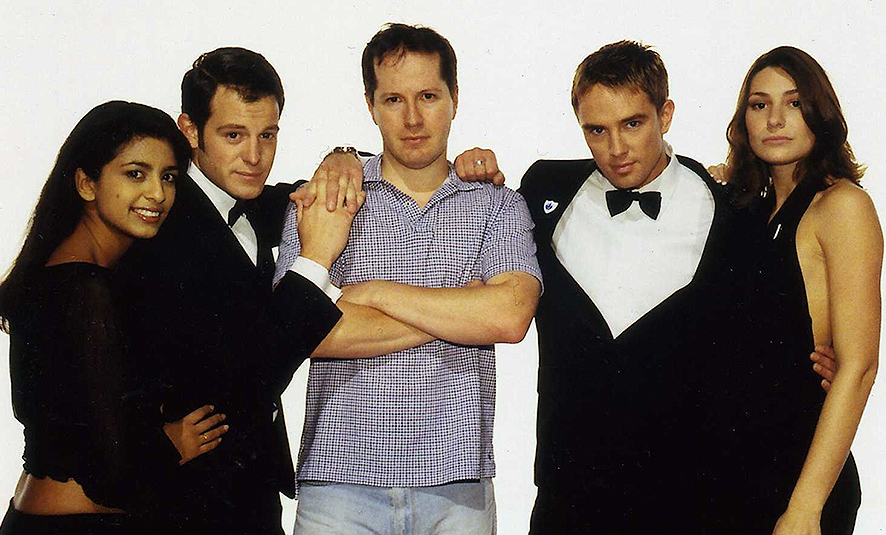
In the JN-T book and in this, you come across as incredibly candid. What’s your sense of responsibility to the people you’re depicting? Sometimes they’re private conversations they don’t expect to see in publication.
Well, there’s various things to say. One is to say, all the people who worked closely with me knew I kept a diary…
But not for publication.
No, but they did sometimes joke: ‘This is going to be your pension, isn’t it? This is going to come out one day’. I said, ‘Well, you better be careful what you say to me, then!’ That’s a slightly fatuous point, but people did know… I thought, first of all, that I would only name people where there was enough balance and enough nuance to show their perspective, or to show them as roundly as I possibly could. So there are a lot of cases where people are not named if it’s something where I think, ‘Actually, nobody needs to know…’ – this producer that I’m beating up, or having a disagreement with, or making fun of, or whatever it is. That person will know, and that’s enough. The story stands without it, it’s not important. There were conversations that I absolutely did leave out. I try to keep it based on the stuff that was to do with the job… obviously, when you work closely with people, you get to know them very well, so they might be telling you about their marriage problems. Problems with substance abuse or whatever it is. None of that was ever going to go anywhere near it. But I couldn’t see the point of doing it if it wasn’t candid. I love Michael Palin, I think he’s marvellous. But I found his diaries rather dull. I think they’re a reflection of the fact he’s a thoroughly lovely man, and therefore there isn’t an edge. But that’s not particularly enjoyable to read.
You let the presenters read an advance copy. How did they react?
Matt [Baker] didn’t think it was a great idea. He personally does not like any form of autobiography, because his view is, if you want to lead a life in the public eye and have a private life, you can’t then have your cake and eat it by saying, ‘Here’s my autobiography I want you to buy in the run-up to Christmas’. I said to him – we had dinner to go through all this – I said to him, ‘I love “good” autobiography where I feel I’m getting an insight into someone’s worldview and how they feel about things, and sometimes I feel that can be a very, very good form of writing…’ But I could absolutely see his point. So he said to me, ‘I trust you, but for my money, I wouldn’t do it.’ So I’m not expecting to crop up on The One Show any time soon talking about it. After he read it, he phoned me up and he said, ‘First of all, is it true I really swore that much?’ And I said, ‘It’s true that we all swore far too much when we thought we weren’t being overheard by children’. And then he said it made him laugh. He said, ‘It made me laugh so much I had tears in my eyes – and it made me cry.’ At one point he was being driven by a BBC driver who thought he was ill because of his reaction. What he didn’t say was, ‘I don’t want you to print this, I don’t want you to print that’. But he was concerned about what Gethin would think [the book records Matt’s negative reaction to working with Gethin, whom he considered a ‘fake’]. But Gethin – 10 years have passed and he’s a lot older and more mature and he understands where Matt was coming from at the time. I knew absolutely, because I’d had that conversation with Gethin, that he doesn’t have any problems with Matt’s perspective being in there.
One might think because of the way the job finished for you there might be an element of…
Sour grapes.
Yeah. Score-settling.
Well, maybe there is! No, I think the truth is you can’t revisit that time and… I did think for a long time I was going to end the book on my last programme in 2007, which was before it all went wrong for me [Richard was dismissed from the BBC at the end of that year]. Although, I’d been asked to leave and that wasn’t great, I was leaving to go to another job at the BBC. It was that summer they decided to take a different view of that whole business with the cat naming. But I thought, ‘In a way, that’s a cheat to end the book there’, because as much as I could be accused of settling scores, the fact is I thought, ‘Actually, that’s not where this story ends. It ends the following year.’ I’d always intended to leave around the 50th anniversary in 2008. And in fact, other things had happened. So I thought, if I’d waded into the ocean as far as 2007 and have all of that out there and then don’t kind of grasp the nettle, people could say, ‘Well, he’s just airbrushed off the end where it went really wrong.’ And including my son’s death [in 2008], which was obviously a massive factor in how I changed my view of a lot of things. That’s the other thing. I don’t really come from that place anymore. Whose score would I be settling? First of all, I honestly don’t ever believe it was really personal. I think, if you do a job like I did, you’re vulnerable. I did accept that, I knew it. I wasn’t naïve about it.
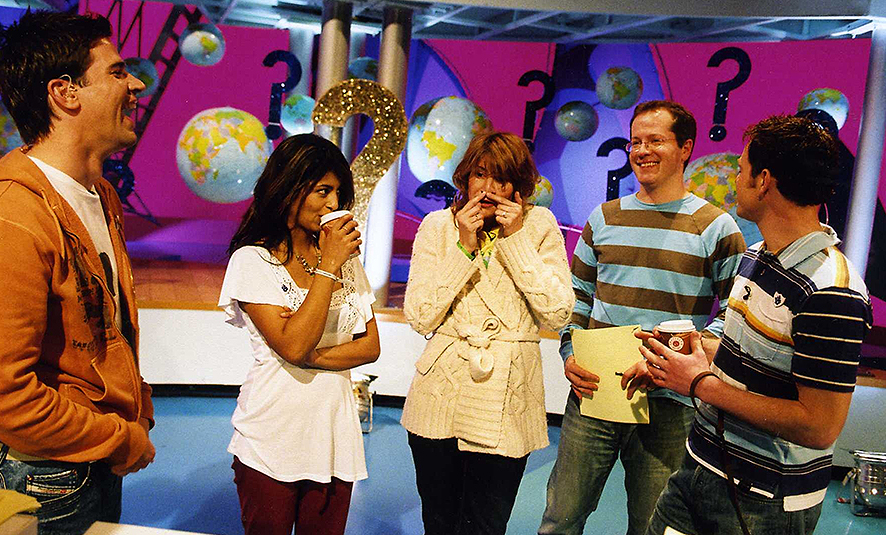
Shortly after you began as a producer on Blue Peter, Richard Bacon was sacked following the News of the World’s story about his cocaine use. And you record in the book how this impacted on Stuart Miles.
Well, Stuart was in love with Richard – which wasn’t something that was public knowledge. As the senior presenter, he had carry on, but obviously, on a personal level, he’d lost one of the man reasons for coming to work – the guy he was infatuated with. And, you know, Richard wasn’t aware of that, I don’t think, because Stuart kind of protected him from it. But, for Stuart, it was a really difficult time, because suddenly he was being expected to be the head boy, but he’d lost the guy who was a lot of the reason why he still enjoyed doing the show.
And is Stuart comfortable that this is in the book? Because he confided in you about his feelings for Richard.
Actually, I wasn’t going to put that in. It was in an earlier draft, and I said to him, ‘Look, it’s in there at the moment, but obviously I’m aware you probably…’ And he went, ‘No, it’s truthful, it happened.’ He read it and he gave me his blessing.
That reflects well on him.
Absolutely. Also, I think he’s very much more comfortable in his own skin now. What’s the issue now, really? At that time it was a bit different. He felt very defensive about his sexuality. [The book reveals that, upon getting the Blue Peter job, Miles was uncertain whether or not he was expected to hide his sexuality]
When you became editor of the show in 2003, you attempted to foster a closer relationship between the production and the presenting teams.
Absolutely. All presenters need to be nurtured in order to draw out of them their potential, and also to sustain it. Remember, Blue Peter is not a six-month gig. For most of it, if they’re any good, they’re going to be doing it for a minimum of three years. And that’s a long time. They’re doing it day in and day out. So therefore, the quicker you can seize on what their gifts are, but help to refine them… I was never a fan of that casting against type. Because I thought, ‘Why make Konnie [Huq] go and fail badly as a Royal Marine’s endurance course?’ Unless you want to play it for comedy, which is valid. But, generally speaking, why do that? It kind of undermines the people you’re working with – the contributors – and it puts her in a horrible place.
Was that a popular approach on the show at the time?
Oh yeah. You can see where it comes from: ‘Let’s get the girls to do the messy job’. Nothing wrong with that if the girl’s going to do it, embrace it, do it well. But I used to think it was a disastrous message if you sent the girl to do a butch thing, and she was all girly about it – pathetic. It was reinforcing the problem, which is why Katy [Hill] was so brilliant, and later Zoe [Salmon]. Both of them had no fear. They were happy to be a binman or play rugby or whatever, and they would go for it. Whereas Konnie was much better doing the quirkier, interpersonal-type things, and the audience really liked her for different reasons. So why put her in that place where she was struggling and not going to look as good? You’ve got to never forget that you’re delivering an entertainment at the end of the day, which people are committing their time to watch. Why make it harder for everybody?
Is it a true to say the presenters became more difficult the longer they were there?
Yeah, yeah. Sarah Greene always used to say, you spend the first year learning, the second year consolidating and the third repeating. Broadly speaking, that’s true. Usually, the early days are a bit tricky for all of them, because there’s so much to learn, especially in live TV. And then they find it, and they’re great and they’re loving it. Then they begin to get itchy feet. The thing that changed, and was different in my time, and was why my kind of core team stayed together for nearly six years – which was unheard of at the time in TV – was really because they’d learned (and I used to bang on about this), ‘Look at what’s happened to Katy. Look at what’s happened to Stuart. Don’t be in such a rush to leave. You’re only in your twenties, you’ve got a whole life ahead of you. You have got one of the best jobs in British telly, why run away from it?’
When you say, ‘Look at what’s happened’ – you mean nothing’s happened?
Well, not that nothing had happened, but it’s much harder. You’re doing Blue Peter – the whole show is a permanent exercise in, ‘How do we make this person shine? How do we give them opportunities?’ No other show is like that. When I saw Matt recently, he said to me, he loves doing The One Show, he loves doing Countryfile – that’s almost the next most perfect job for him – but the difference between The One Show and Blue Peter is that on The One Show he’s sitting on a sofa talking to people who are having amazing lives, on Blue Peter, he was the one having the amazing life. Liz [Barker] was a trickier one to fathom. She was very popular, because she was very genuine. She was really warm. I really, really liked her. I thought she was special. But she needed a level of production that generally isn’t there. She needed to be protected and loved. It sounds corny to say it, but I don’t think she was one of those presenters who can produce themselves. Very often, as a professional presenter, not unreasonably, if you’re good, you’re expected to turn up and be able to turn it on like a tap. Liz couldn’t really do that. I think that’s why, for her, is wasn’t going to be a long term career. But the joy of it was, as a team of four – Simon [Thomas], Matt, Konnie and Liz – they all complemented each other. I mean, there was a bit of competition at times, but nothing untoward. Certainly no sulking or big dramas. And there was also lots of genuine affection and humour. They were there for each other, and that was a wonderful thing. We really tapped into that, and that’s why, I think, we had a kind of golden era, because, just look at those annuals. I remember, every year, I used to put those annuals together, and I would think to myself, ‘We’ve had another incredible year!’ They all played to their strengths and came together. That’s very rare in TV.
![]()
Tomorrow, at 5.15pm, part two of this interview, in which Richard shares thoughts on his Blue Peter presenting teams, and talks about the Blue Peter cat scandal. Until then… Goodbye!




